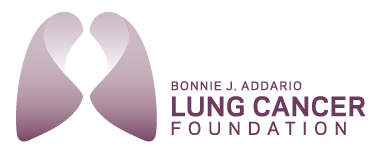
Society for Immunotherapy of Cancer Partners with Bonnie J. Addario Lung Cancer Foundation to Increase Participation in the Lung Cancer Registry

MILWAUKEE — The Society for Immunotherapy of Cancer (SITC) announced a new partnership to raise awareness of and participation in the Lung Cancer Registry, an initiative led by research and patient advocacy organizations, the Bonnie J. Addario Lung Cancer Foundation (ALCF), American Lung Association’s LUNG FORCE and the International Association for the Study of Lung Cancer.
The Lung Cancer Registry is a repository of lung cancer patients’ medical information compiled to allow for quick analysis of patient data by researchers. The Registry is conducting a study that helps researchers understand the side effects of immunotherapy, involving patients with non-small cell lung cancer (NSCLC) who have undergone therapy using immune checkpoint inhibitors.
“Results of this study will provide the field with a greater understanding of how immune checkpoint inhibitor toxicities affect patients, and ultimately better inform patients considering immunotherapy for treating NSCLC,” said SITC President Lisa H. Butterfield, PhD. “SITC is proud to serve as a project partner of the Lung Cancer Registry.”'
SITC is the world’s leading member-driven organization specifically dedicated to improving cancer patient outcomes by advancing the science and application of cancer immunotherapy. As a project partner of the Registry, SITC is leveraging the society’s connections to translational researchers and clinicians to raise awareness of and participation in this important initiative, including engaging members to encourage their patients to register.
SITC will promote the Registry through a variety of means, both online and during SITC-hosted programming which includes the Advances in Cancer Immunotherapy™, the society’s upcoming 15 regional education programs dedicated to teaching basic principles and fundamentals of cancer immunotherapy treatments to community oncologists, nurses and other advance practice providers.
Research has shown that immune checkpoint inhibitors have provided durable remissions and prolonged survival for patients with NSCLC but can also cause a range of unique side effects that need to be better understood for maximal patient benefit. The Lung Cancer Registry immunotherapy survey collects medical information from participating patients including any side effects that may arise during therapy, the extent to which the patient experienced the side effects, and whether the patient’s quality of life is impacted as a result in order to address this challenge.
“Nearly a quarter-million Americans will be diagnosed with lung cancer this year,” said Bonnie J. Addario, 14-year lung cancer survivor and founder of the ALCF. “Immunotherapy, along with targeted therapy, has helped transform the treatment of lung cancer over the past decade. Gathering information from patients, through registries like ours, and passing that knowledge on to other lung cancer patients accurately and quickly is helping patients live longer, which is our goal.”
The Registry is sponsored by ALCF, the American Lung Association's LUNG FORCE and the International Association for the Study of Lung Cancer. SITC members Adam P. Dicker, MD, PhD (Thomas Jefferson University), and Heather S. Jim, PhD (H. Lee Moffitt Cancer Center & Research Institute), are leading the efforts on the subsequent patient study.
Patients with any form or stage of lung cancer, including patients with NSCLC, can join the Registry at www.lungcancerregistry.org. For more information about immunotherapy for lung cancer, visit the society’s online learning portal, SITC Cancer Immunotherapy connectED.




